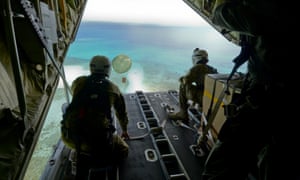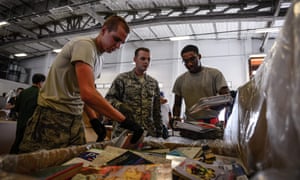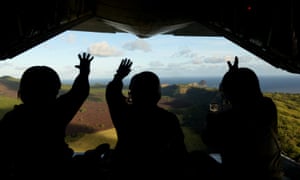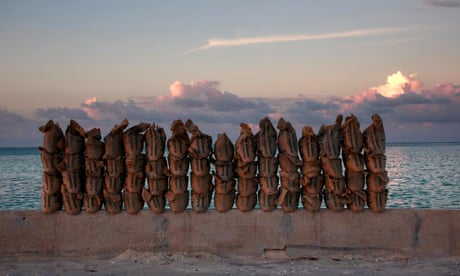Isolated Pacific islands get Christmas presents by parachute
Australian, Japanese and US air force planes deliver food and toys to remote atolls as part of the annual Operation Christmas Drop

Australian, Japanese and US air force planes are dropping food and toys on remote atolls in the Pacific as part of the US military’s longest-running humanitarian relief mission.
The packages will support 20,000 people across 56 islands in Micronesia, the Mariana Islands and Palau.
The US Air Force began the annual Operation Christmas Drop in 1952 when a Guam-based air crew noticed residents on the island of Kapingamarangi waving at them as they flew overhead. The crew gathered items they had on the plane, attached a parachute and dropped them to the islanders.

It’s a feel-good mission that also helps the US achieve political aims, namely deepening three-way cooperation with close allies Australia and Japan, which are first-time participants. Analysts say the US has been boosting the trilateral relationship in recent years as it keeps an eye on China’s growing military.
The boxes include books, canned food and items such as fishing nets that will help the islanders maintain their largely subsistence lifestyle. This year, each package will also include a soccer ball.
The planes fly low, look for a safe spot to drop the bundles, then release them from the back of the C-130s. University of Guam distance education staff use ham radios to talk to the islanders throughout the year and relay their needs.
Japan and Australia each sent one C-130 to join three from the US.
US Air Force Brig Gen Gregory Guillot, who is the director of strategic plans at Pacific Air Forces, said the Christmas drop offered a good trilateral training opportunity, particularly at a time of budget constraints and busy units.
Guillot said the three air forces had been increasing their cooperation, and noted that they had also come together for the annual Cope North exercise on Guam and Red Flag drill in Alaska. Inviting Australia and Japan to Operation Christmas Drop was a logical extension of other work the countries had been doing, he said.
“Partnerships here in the Pacific are the key cornerstone in our strategy to maintain regional stability and prosperity. Japan and Australia share a common interest in that goal,” Guillot said.

The executive director of Pacific Forum thinktank in Honolulu, Brad Glosserman, said the three-way relationship was the “gold standard” for the US military’s strategy toward allies in the Pacific. The US wants to break out of the “hub and spoke” system of bilateral alliances it has with five Asian countries and link multiple allies together, he said.
The US has tried something similar with South Korea and Japan, but this grouping has struggled amid tensions in Seoul and Tokyo over Japan’s past colonial rule of Korea.
The improved military capabilities of US allies were a factor driving the increased cooperation, as was China’s rise as a military power, Glosserman said.
Source: The Guardian

